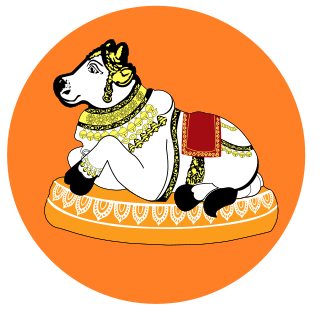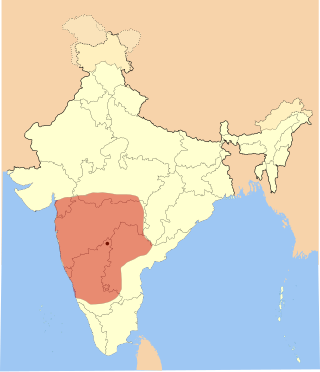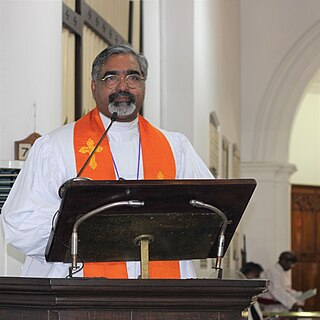
Lingayatism or Veera Saivism is a Hindu denomination based on Shaivism. Initially known as Veerashaivas, since the 12th-century adherents of this faith are known as Lingayats. The terms Lingayatism and Veerashaivism have been used synonymously, but Veerashaivism may refer to the broader Veerashaiva philosophy which predates Lingayatism, to the historical community now called Lingayats, and to a contemporary (sub)tradition within Lingayatism with Vedic influences. Modern day Veerashaivas believe in the caste system and gender discrimination while modern day Lingyats do not.

Basava, also called Basaveshwara and Basavanna, was a 12th-century CE Indian statesman, philosopher, poet, Lingayat social reformer in the Shiva-focussed bhakti movement, and a Hindu Shaivite social reformer during the reign of the Kalyani Chalukya/Kalachuri dynasty. Basava was active during the rule of both dynasties but reached the peak of his influence during the rule of King Bijjala II in Karnataka, India.

United Theological College (UTC) is an Eccumenical Christian seminary founded in 1910 situated in the southern city of Bangalore in the state of Karnataka in South India and affiliated to India's first Theological University, the Senate of Serampore College (University) {a University under Section 2 (f) of the University Grants Commission Act, 1956}with degree-granting authority validated by a Danish Charter and ratified by the Government of West Bengal.

Karnataka Theological College(founded in 1847) is an ecumenical seminary catering to the Kannada-speaking students wishing to pursue the priestly vocation. KTC is located in Mangalore of Karnataka in South India, and is affiliated to the nation's first University, the Senate of Serampore College.

Allamaprabhu was a 12th-century mystic-saint and Vachana poet of the Kannada language, propagating the unitary consciousness of Self and Shiva. Allamaprabhu is one of the celebrated poets and the patron saint of the Lingayata movement that reshaped medieval Karnataka society and popular Kannada literature. He is included among the "Trinity of Lingayathism", along with Basavanna, the founder of the movement, and Akka Mahadevi, the most prominent woman poet.
Channabasavanna also known as " Guru Channabasaveshwara " was Basava's nephew and one of the foremost Sharanas of the 12th century. He, along with Basava, Allama Prabhu and Akka Mahadevi, played a pivotal role in the propagation of the Lingayat faith. He was the youngest among the sharana leaders and grew up in the household of Basavanna as he was the son of Nagalambike, Basava's own sister. He also wrote the Karana Hasuge which is one of the most sacred texts of the Lingayats, among many vachanas. He propounded the "shatasthala" philosophy associated with the six holy places of Veerashaiva Lingayat creed. He succeeded to the Shunya Simhasana at Anubhava Mantapa, Kalyana after the departure of Allama Prabhu, circa 1162ad. His young shoulders carried on the legacy of Basava after the latter's departure to Kudalasangama in 1162ad. He is credited to have systematised the entire manual of simple rituals for the followers. He was a strong advocate of the Ishtalinga wearing and expounded the material as well as the esoteric meaning of that divine symbol. He held together the nascent group of Shivasharanas and Jangmas in tumultuous times of clashes with the orthodox Brahmins and heretic Jains. Following the assassination of Kalachuri King Bijjala II in 1167 A.D, Channabasava along with his followers migrated to Ulavi safeguarding the Vachana literature. He attained Samadhi state there at the age of 25 passing on the leadership of the movement to Siddarama.

A large body of Western Chalukya literature in the Kannada language was produced during the reign of the Western Chalukya Empire in what is now southern India. This dynasty, which ruled most of the western Deccan in South India, is sometimes called the Kalyani Chalukya Dynasty after its royal capital at Kalyani, and sometimes called the Later Chalukya Dynasty for its theoretical relationship to the 6th-century Chalukya dynasty of Badami. For a brief period (1162–1183), the Kalachuris of Kalyani, a dynasty of kings who had earlier migrated to the Karnataka region from central India and served as vassals for several generations, exploited the growing weakness of their overlords and annexed the Kalyani. Around 1183, the last Chalukya scion, Someshvara IV, overthrew the Kalachuris to regain control of the royal city. But his efforts were in vain, as other prominent Chalukya vassals in the Deccan, the Hoysalas, the Kakatiyas and the Seunas destroyed the remnants of the Chalukya power.
D. S. Satyaranjan was a Silver Jubilee Pastor, a New Testament Scholar, and an Administrator who served as the Registrar of the Senate of Serampore College (University), the nation's first University {a University under Section 2 (f) of the University Grants Commission Act, 1956} with degree-granting authority validated by a Danish Charter and ratified by the Government of West Bengal.
C. D. Jathanna was the fourth Bishop - in - Karnataka Central Diocese headquartered in Bangalore with the Cathedra of the Bishop placed at St. Mark's Cathedral, Bangalore.
Robert Scheuermeier was the first Principal of the Karnataka Theological College, Mangalore, a Seminary affiliated to the country's first University, the Senate of Serampore College (University), Serampore.
C. L. Furtado is CSI-Bishop Emeritus - in - Karnataka Southern of Church of South India. Furtado became the third Bishop on 25 August 1997, the date on which he was consecrated as Bishop in the diocese that is headquartered in Mangalore with the Cathedra of the Bishop placed at CSI-Shanthi Cathedral, Mangalore.
Hannibal Richard Cabral(Born 1955) was the former Principal of Karnataka Theological College, Mangalore, a Seminary established in 1965 and affiliated to the nation's first University, the Senate of Serampore College (University). Cabral was appointed by the College Council as Principal in 2009 as John Sadananda, then Principal, was elevated to the Bishopric of the Karnataka Southern Diocese of the Church of South India.
Bishop Babbili Prabhudass(died 1996) was the first elected Bishop - in - Karimnagar Diocese of the Church of South India which was ecclesiastically bifurcated from the Diocese of Dornakal of the Church of South India in early 1978. Prabhudass led the bishopric for a period of five years from 1978 through 1982.
Rajula Annie Watson is a Theologian who presently teaches at the Karnataka Theological College, Mangalore, a Seminary established in 1965 and affiliated to the nation's first University, the Senate of Serampore College. Annie has been a member of the Association of Theologically Trained Women of India since 1991 as well as Associate Presbyter at CSI-Hebich Memorial Church, Mangalore.
Bishop Emeritus John S. Sadananda was the Master of Senate of Serampore College (University), the nation's first University {a University under Section 2 (f) of the University Grants Commission Act, 1956}) with degree-granting authority validated by a Danish Charter and ratified by the Government of West Bengal.
Dharmakkan Dhanaraj was an Indian Old Testament Scholar who taught at the Karnataka Theological College, Mangalore, a Seminary established in 1965 and affiliated to the nation's first University, the Senate of Serampore College (University).
Sydney S. Salins is a New Testament Scholar who teaches at the Karnataka Theological College, Mangalore, a Seminary established in 1965 and affiliated to the nation's first University, the Senate of Serampore College (University).
Daniel Rathnakara Sadananda is a New Testament Scholar who is re-elected as the General Secretary (Triennium 2017-2020) of the Church of South India Synod headquartered in Chennai as well as the Chairperson (triennium 2015-2018) of the Council of the United Theological College, Bangalore, the only autonomous College under the Senate of Serampore College (University). He also serves as the Vice President of National Council of Churches in India (2016-2020) as well Executive Secretary of the Communion of Churches in India comprising CNI, CSI, Marthoma Churches and now MCI.

A. C. Solomon Raj(born 18 March 1961) is the seventh successor of Frank Whittaker and eighth Bishop in Medak of the Protestant Church of South India Society and shepherds the Diocese from the Cathedra of the Bishop housed in the CSI-Medak Cathedral in Medak Town, Telangana, India. On 12 October 2016, the Church of South India Synod headquartered in Chennai, appointed Solomon Raj to assume the ecclesiastical Office of the Bishopric of Medak and was consecrated the next day on 13 October 2016 at the CSI-St. George's Cathedral, Chennai, ending four years of sede vacante in the Diocese of Medak which was without a bishop during the intervening period of 2012–2016.
There are three kinds of Seminaries in India:





